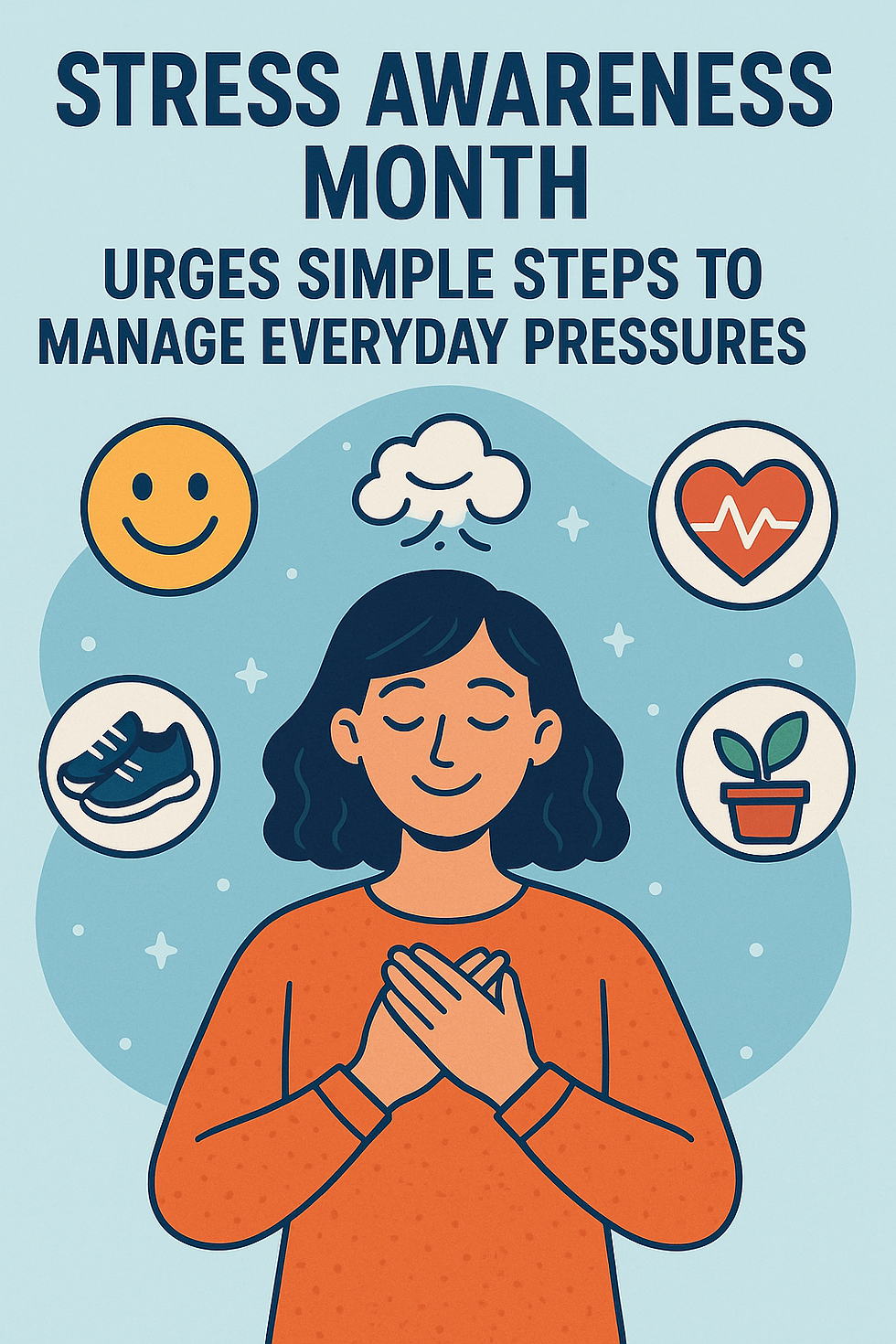Stress Awareness Month: PHA urges simple steps to manage everyday pressures
- Love Ballymena
- 17 hours ago
- 3 min read

This April, as part of Stress Awareness Month, the Public Health Agency (PHA) is encouraging people across Northern Ireland to adopt small, practical steps to manage stress and bolster mental and emotional wellbeing.
With modern life presenting a myriad of challenges—from work pressures to financial worries—the PHA is highlighting how recognising and addressing stress can lead to healthier, more resilient lives.
Stress, often described as the feeling of being overwhelmed or unable to cope, can stem from mental or emotional pressures and manifest in various ways. Common signs include disrupted sleep, changes in appetite, difficulty concentrating, increased alcohol consumption, or reliance on drugs. People may also experience anxiety, irritability, racing thoughts, or persistent worry, all of which can disrupt daily life.
Fiona Teague, Mental Health and Emotional Wellbeing Lead at the PHA, emphasised the importance of proactive stress management.
“If we neglect our physical and mental health, our bodies struggle to handle everyday stresses,” she said. “Work, relationships, financial concerns—these can all weigh heavily. Stress can hinder our ability to tackle the very issues causing it, while also affecting our routines and responsibilities.”
Teague added that Stress Awareness Month offers a valuable opportunity to reflect. “It’s a chance to identify what’s causing stress and to remind ourselves there are practical ways to cope. By adopting simple habits, we can better manage stress and improve our overall health.”
The ‘Take 5 Steps to Wellbeing’ Approach
Central to the PHA’s campaign is the evidence-based ‘Take 5 Steps to Wellbeing’ model, which promotes five key actions: connect, be active, take notice, keep learning, and give. These steps are designed to build resilience and foster a sense of control over one’s mental and emotional health.
Connect: Building and maintaining relationships is vital. The PHA encourages people to meet with friends or family, share feelings openly, and check in on others who may be showing signs of stress. A simple conversation can make a significant difference.
Be Active: Physical activity is a proven stress reliever, helping to improve sleep, balance hormones, and boost endorphins. Whether it’s a brisk walk, a bike ride, gardening, or even housework, any movement counts.
Take Notice: Practising mindfulness—pausing to focus on breathing or appreciating surroundings—can help ground individuals. The PHA also advises reducing screen time and social media use, which can exacerbate anxiety, and reflecting on stress triggers to develop coping strategies.
Keep Learning: Trying new activities or revisiting old hobbies can invigorate the mind. The PHA points to resources like www.MindingYourHead.info, where a self-help toolkit offers practical skills for stress management.
Give: Sharing personal experiences of coping with stress can benefit both the individual and others. Acts of kindness or support can foster connection and resilience.
Support and Resources
Recognising that stress affects everyone differently, the PHA is keen to promote open dialogue. “Talking to a friend, family member, or colleague about how you’re feeling—or how they’re coping—can be incredibly helpful,” Teague noted. “It’s also important to stay attuned to those around us.”
For those seeking structured support, the PHA is promoting free online stress control classes led by Clinical Psychologist Dr Jim White.
These sessions cover topics such as understanding stress, managing thoughts and behaviours, and improving sleep. Accessible without registration, the classes are available at www.stresscontrolclass.com, with details of upcoming sessions regularly updated.
Further resources, including the ‘Take 5 Steps to Wellbeing’ framework and the ‘Steps to Deal with Stress’ booklet, can be found at www.MindingYourHead.info. The website offers practical advice and tools to help individuals navigate stress effectively.
Immediate Help for Those in Crisis
The PHA also reminds the public of critical support services for those in distress. Lifeline, a 24/7 helpline staffed by trained counsellors, is available at 0808 808 8000 for anyone experiencing a crisis. In cases of immediate danger, such as risk of suicide or urgent medical needs, the PHA urges people to call 999 without delay.
As Stress Awareness Month unfolds, the PHA’s message is clear: small, intentional steps can pave the way to better stress management and improved wellbeing. By connecting, staying active, and seeking support when needed, individuals can build resilience to face life’s challenges head-on.
For more information and resources, visit www.MindingYourHead.info or www.stresscontrolclass.com.
